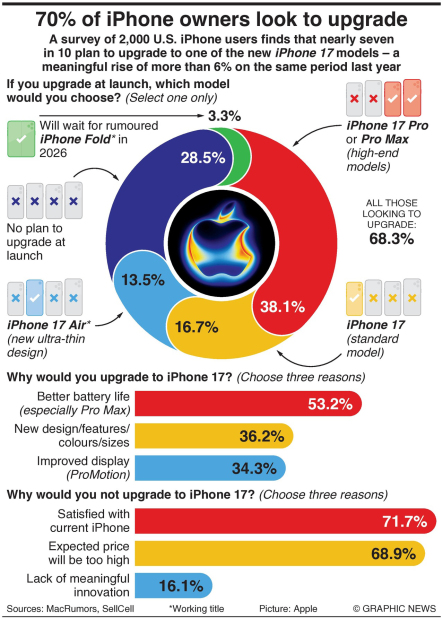APPLE has postponed the launch of its new iPhone Air model in China due to regulatory issues surrounding its eSIM design, the company said, reports CNBC.
Wireless carriers in China need a special licence from the government before they can sell a new device with an eSIM, and the carriers haven’t secured that approval yet, Apple said. The company added that it is working to make the device available in China as soon as possible.
Apple announced the iPhone Air at its annual event on Tuesday. The device, which is 5.6 millimetres thick, marks the first major new iPhone design since the iPhone X was introduced in 2017. The iPhone Air doesn’t support a physical SIM card, and instead features an eSIM built into the device.
CEO Tim Cook told CNBC’s Jim Cramer yesterday that the eSIM is what allows the device to still have “great” battery life.
“It’s eSIM only, and so we were able to take the battery and extend the battery to areas that previously had the physical cell,” Cook said.
The company previously said the iPhone Air would become available for preorder in the region yesterday before it goes on sale next Friday.
As of yesterday morning, the iPhone Air product page on Apple’s China website stated, “Release information will be updated later.”
The website notes that China Mobile, China Telecom and China Unicom will offer eSIM support for the iPhone Air, “with specific timing subject to regulatory approval.”
Meanwhile, the South China Morning Post reported last week that shop assistants at some Apple-authorised resellers in Foshan and other major cities in southern Guangdong province had not received training for eSIM support. In comparison, staff at European resellers were asked to complete a relevant course as of last Friday, MacRumors, an Apple news aggregator, reported last week.
Meanwhile, iPhone Air models purchased outside mainland China will be unable to install an eSIM profile from mainland carriers, discouraging consumers from buying a handset overseas for the greater software availability, including Apple Intelligence.
Market research firm IDC said in a report on Thursday that customers worldwide had an appetite for thinner devices. For example, the Samsung S25 Edge, launched in May with a thickness of 5.8mm, sold over a million units in the first month to become the sixth highest-selling smartphone globally in the high-premium price segment between $1,000 and $1,600.
IDC expected iPhone Air to contribute to “well over” 5 per cent to 7pc of Apple’s global shipments of its Plus models.



&uuid=(email))